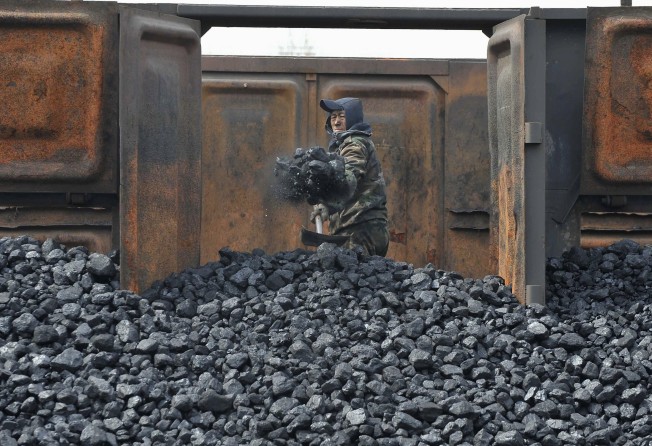China’s coal sector set to suffer more economic chills this year
Shaanxi province, the mainland’s major coal export base, is shutting down 61 coal miners

China’s troubled coal sector has been suffering further from economic chills, with more listed coal producers recording declines in profit for the first nine months of the year.
And the industry’s “winter” may not be over yet, with analysts predicting coal prices may slump further in the fourth quarter due to heavy downward pressure on the mainland economy and sluggish industrial demand.
The CSI SWS Coal Index, a gauge that tracks listed coal companies in Shanghai and Shenzhen, fell 3.2 per cent last week and has fallen a further 1.7 per cent this week.
China Shenhua Energy, the world’s largest coal supplier, saw its shares drop 4.7 per cent and 2 per cent in Hong Kong and Shanghai respectively last week, after the company reported third-quarter profit that slid 40 per cent year on year to 4.8 billion yuan, due to a continuous fall in coal prices and weak demand. In the same period, China Coal Energy, the mainland’s second-largest coal producer, sank 8.5 per cent in Hong Kong and retreated 5 per cent in Shanghai, as its third-quarter loss widened to 701 million yuan, compared with a loss of 27 million in the same period last year. China Coal Energy expects to record a net loss for 2015, the first since its listing in 2008.
China Shenhua Energy has lost a combined 2.1 per cent in Shanghai in the first two trading days of this week, and its H-shares are down 0.6 per cent. China Coal Energy shed a combined 2.4 per cent in Shanghai in the same period, while its Hong Kong-listed stock recovered 1.5 per cent.
“Despite China’s expansionary fiscal and monetary polices to bolster growth, industrial demand is still slowing further, leading to a continuous fall in coal prices,” GF Securities analysts An Peng and Shen Tao said in a recent research report, noting that demand for coal had been “extremely weak”.
“It’s difficult for the industry fundamentals to improve in the near and medium term,” they predicted.
Among the 27 mainland-listed coal companies that have revealed third-quarter results, more than half have posted a loss, compared with the 45 per cent of coal firms that reported a loss in the first half of the year, according to statistics from financial information site 51iFind.com.
Analysts said the deteriorating results for the coal sector were mainly due to a slump in coal prices, with the price of steam coal, mostly used for power generation, falling 7 per cent quarter on quarter on the third quarter of the year and the price of coking coal, mainly used in steel production, falling 4 per cent. The price of steam coal has fallen 17 per cent so far this year, and the price of coking coal is down 15 per cent.
Weak industrial demand, coupled with an overcapacity problem plaguing the coal industry, has forced mainland governments to shut down many coal miners. Shaanxi province, the mainland’s major coal export base, announced last month that it would shut down 61 coal miners with “operation difficulties” or “lower than expected earnings”. In August, the State Council, China’s cabinet, said the country had suspended 48 per cent of all the coal mines as an effort to eliminate outdated production capacity.
The fourth quarter is traditionally considered a high season for coal industry demand, but analysts are not that optimistic about the prospects of a “warm winter”.
“Although the markets have entered the fourth quarter, there is no sign of improvement in the energy-intensive industries and electricity generation,” said Zu Guopeng, an analyst for Citic Securities. “We have been seeing no high demand for thermal (steam) coal in the high season.”
He even forecast that steam coal prices would fall further in the fourth quarter.
Zu said coking coal prices had fallen since last month in several regions, including Shanxi and Hebei. Meanwhile, the downstream steel industry was also facing heavy pressures from high inventories and slowing demand due to the economic downturn.
A number of coking coal producers had experienced worsening cash squeezes, he added.
“The demand and prices for coking coal may weaken further,” Zu said.
Lu Ping, from China Merchants Securities, said high inventory and suppressed demand for electricity might continue to keep a lid on coal prices in the near term, while the long-term demand for coal would also be constrained, as China had pledged to slash coal consumption by more than 160 million tonnes in the next five years to reduce air pollution.
Citic Securities reminded investors of possible risks for the coal sector, including worsening economic conditions in the fourth quarter, a further slowdown in coal demand, and stricter controls on energy consumption and greenhouse gas emissions.
GF Securities suggested investors take a cautious approach towards the sector and watch closely for signs of a favourable turn in fuel demand in the next few months.